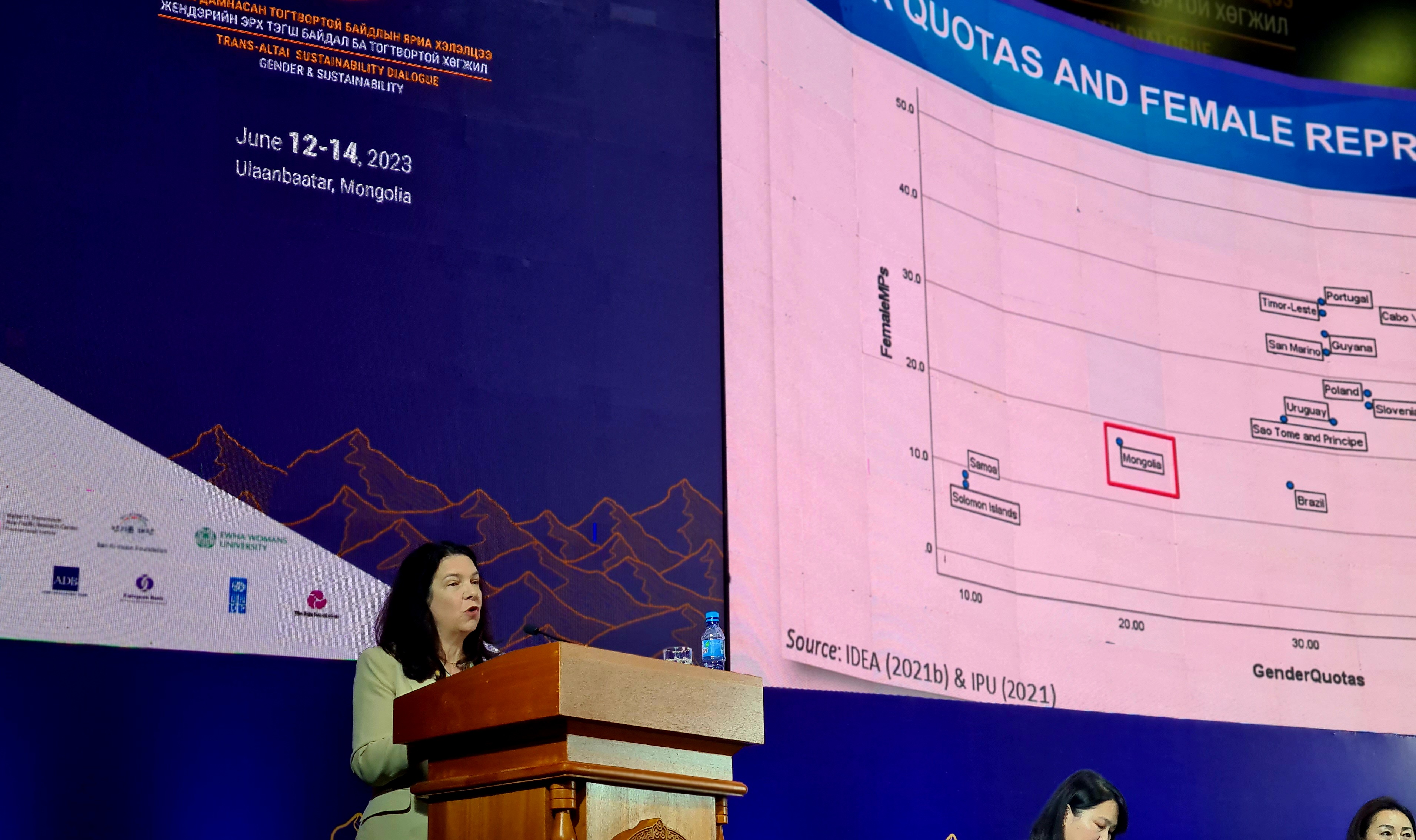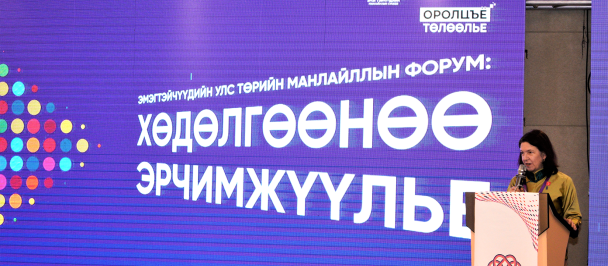Trans-Altai Sustainability Dialogue: Gender and Sustainability
June 13, 2023

Ms. Elaine Conkievich, UNDP Mongolia Resident Representative
Remarks by Ms. Elaine Conkievich, UNDP Resident Represetantive in Mongolia
Your Excellency Minister Bulgantuya, Honorable guests and distinguished panelists and participants,
It’s my absolute pleasure to speak to you in the Trans-Altai Sustainability Dialogue on Gender and Sustainability - as gender equality, and more specifically women’s empowerment, is the most essential issue to address in the 21st century.
And the timing could not be more important than now, as the parliament of Mongolia is discussing changes to the gender quota in the electoral law.
Data shows that women are underrepresented at all levels of decision-making worldwide, including in Mongolia, and that achieving gender parity in political life is still regrettably very far off.
- As of 1 January 2023, there are 31 countries where 34 women serve as Heads of State and/or Government. At the current rate, gender equality in the highest positions of decision-making will not be reached for another 130 years.
- Only six countries have 50 per cent or more women in parliament in single or lower houses: At the current rate of progress, gender parity in national legislative bodies will not be achieved before 2063.
- Data from 136 countries shows that women constitute nearly 3 million, or 34 per cent of elected members in local deliberative bodies. Only two countries have reached 50 per cent, and an additional 20 countries have more than 40 per cent of women in local government.
The Gender Gap report of the World Economic Forum from 2022, that measures gender parity, in terms of Economic Participation and Opportunity, Educational Attainment, Health and Survival, and Political Empowerment says, it will take staggering 132 years to reach full gender parity globally. The number is even worse for the Asia Pacific region including Mongolia where it would be 168 years.
The latest UN Women Report says, at the current rate of progress, it may take 286 years to remove discriminatory laws and close prevailing gaps in legal protections for women and girls.
But instead of talking about how long it should take, we here should be asking ourselves, why not now? And why not now? There is absolutely no reason why women should not have equal representation in the national and local parliaments in Mongolia.
To those who say, there are not enough women to run as candidates, please know that with our KOICA-supported project, we have trained and prepared 1600 women to be candidates in next year’s elections.
To those who say, the public does not support women in politics, please see the April 2023 poll here in Mongolia among 1000 respondents by Sant Maral, where 82.9% DISAGREE that women should take care of the family and the household and leave politics to men. That is a very clear message. An overwhelming majority of the population, voters we can say, are saying that women should be in politics.
Here I would like to state clearly: gender equality is a right, and not a privilege. Women have the right, to be equally represented in decision-making bodies.
And I would like to emphasize, that this is not a women’s issue. It’s an issue for men, as well as women, because it affects us all. And here I would like to thank the male champions in the State Great Hural, that are supporting gender parity for women in decision-making. It takes the leadership of MPs, male and female, political parties, and the voters to make gender equality a reality, now, in Mongolia.
No society can develop and prosper – economically, politically, or socially – when half of its population - women are not able to fulfill their full potential.
Mongolia is no exception.
While there has been progress, Mongolia is still far from achieving gender equality in all decision-making levels, particularly, in the Parliament.
With 20% gender quota for electoral lists, Mongolia has only achieved 17% women in parliament.
Mongolia ranks 134th out of 186 countries in terms of women in national Parliaments as per Inter-Parliamentary Union, regrettably far from gender equality.
With the current discussion on increasing the gender quota, for more female candidates in Mongolia, a quota of at least 30% female candidates in the majoritarian system and 1:1 on proportional representation, would only bring Mongolia, an increase from the current 17%, to around 20-22% women being elected in parliament. This is considering the increased number of MPs through the recent constitutional amendment.
With the candidate gender quota set to at least 40%, this could bring 23-25% of women elected to the Parliament.
Thus, even with a higher 40% quota in the majoritarian system and 1:1 male-female on proportional representation, Mongolia still would not even, necessarily reach the global average of women in parliament, which currently stands at 26%. Is this where Mongolia wants to be?
This is important to understand - that a 30%, or even 40% quota, in majoritarian system and 1:1 gender ratio in the proportional - does not mean 30% or 40% of the elected Parliament Members will be women.
Thus, it is concerning that the current discussion to significantly increase the gender quota is so highly contentious.
It should be a given, that the voices and rights of 51 percent of Mongolia’s population, women and girls, are equally represented in the legislative bodies.
In this regard, the political parties have a critical role to play in creating a conducive environment for women to succeed in politics. 10 political parties, including the 3 currently in parliament, signed a pledge in April, just 2 months ago, to set a 40% quota internally and to work for gender parity in decision-making. This is a key step in increasing women MPs at the national and local levels for the upcoming elections.
Thus, it is imperative that political parties translate the commitments they made, in the pledge, into tangible results, and ensure that they are fulfilled. Only then, concrete and meaningful change, can be brought about in Mongolia.
I am hopeful that the upcoming amendments of the Law on Political Parties and the Law on Elections will play a transformative role in achieving equal representation of women in Mongolia.
But changes in the law are not enough. Deep-rooted gender stereotypes and discriminatory social norms pose significant obstacles to women in decision-making. Particularly concerning is the portrayal of women politicians in the media.
To address these stereotypes, UNDP, under our KOICA-supported project, is actively collaborating with media outlets, to promote gender-responsive journalism, to respect women politicians, and to portray women politicians, as equal and capable leaders, in their own right.
Last year, we trained nearly 600 journalists, on gender-responsive and ethical journalism, while creating a database of 500 women experts and leaders, for the first time, to tackle the under-representation of women in media content.
Beyond the current discussion on the gender quota and women and elections. I would like to raise another important matter directly related to this Dialogue, which everyone should be deeply concerned with.
2023 marks the halfway point in the implementation of the Sustainable Development Goals. While there is a dedicated Goal on Gender Equality, SDG 5, gender equality is a cross-cutting issue, that is mainstreamed across the 17 Goals. Any lack of progress on gender equality, will strongly hinder progress towards achieving ALL of the SDGs.
As I am speaking about women in decision making, let’s look at SDG 5.5 – “Ensure women’s full and effective participation and equal opportunities for leadership at all levels of decision making in political, economic and public life”:
UNDP’s SDG Push diagnostics show 49 synergies with other SDG targets. Women’s equal participation and leadership in political, economic, and public life are essential to achieving ALL the SDGs by 2030.
This shows, how clearly and how deeply, women’s leadership is related to other SDGs. Take for example:
– Women’s leadership and participation will significantly contribute to poverty eradication (SDG 1) by promoting gender-responsive policies, inclusive economic opportunities, and social protection programs that address the specific needs of women and girls.
– Women's leadership enhances health systems' (SDG3) responsiveness to women's health needs, including sexual and reproductive health, leading to improved healthcare access, maternal health, and reduction in gender-based violence.
– Women's involvement in the energy sector (SDG 7) promotes gender equality in energy policies and programs, fostering sustainable energy access, clean energy solutions, and renewable energy entrepreneurship for women.
– Women’s participation leads to gender-responsive labor market policies, equal pay, decent work conditions, and inclusive economic growth. (SDG 8)
– Women's involvement in urban planning and decision-making leads to gender-responsive and inclusive cities (SDG 11), ensuring safe and accessible infrastructure, affordable housing, and public spaces for all.
– Women’s participation in climate decision-making ensures gender-responsive climate policies, promotes women’s leadership in climate action, and addresses gender-specific vulnerabilities to climate change. (SDG 13)
– Women's participation in land and forest management, ensuring gender-responsive land rights, sustainable land use practices, and conservation of biodiversity and ecosystems. (SDG 14)
And I could go on.
Though it should be clear that full and effective participation of women in decision-making is essential for sustainable development, there are still people, who question why gender equality is needed and how it benefits Mongolia.
These people could be our friends, family members, and colleagues, and even members of parliament – which means we need to work to change the understanding and mindset of the public, as well as those in decision-making positions.
We need to help these persons understand, that when women’s voice and agency, fully and equally contribute to development:
- Policies and regulations are inclusive and address the needs of everyone
- Economic growth is inclusive, and leaves no one behind
- The environment is better protected and cared for
- Society is more peaceful, with more resilient communities
While the challenges to making progress on gender equality are daunting, we should not be discouraged. In fact, it should be the very reason why we must increase our advocacy for women’s rights. So, we all need to:
– advocate for laws and regulations that promote and support gender equality
– raise awareness in our respective fields on why gender equality matters
– support women candidates to run for decision-making roles
– and encourage voters to elect women candidates
168 years is simply way too long to wait for something that should be a reality today.
Thank you.

 Locations
Locations